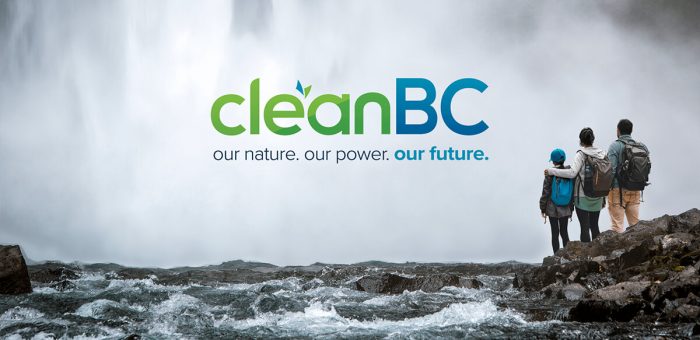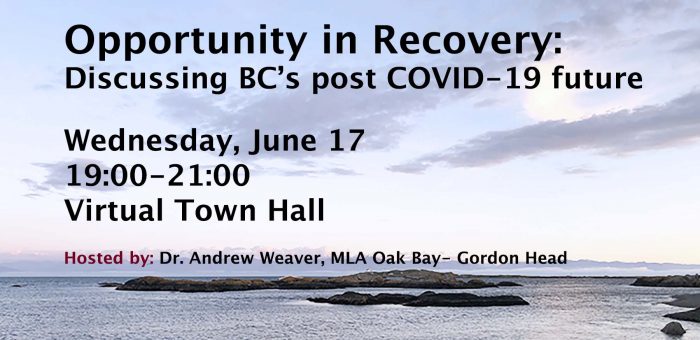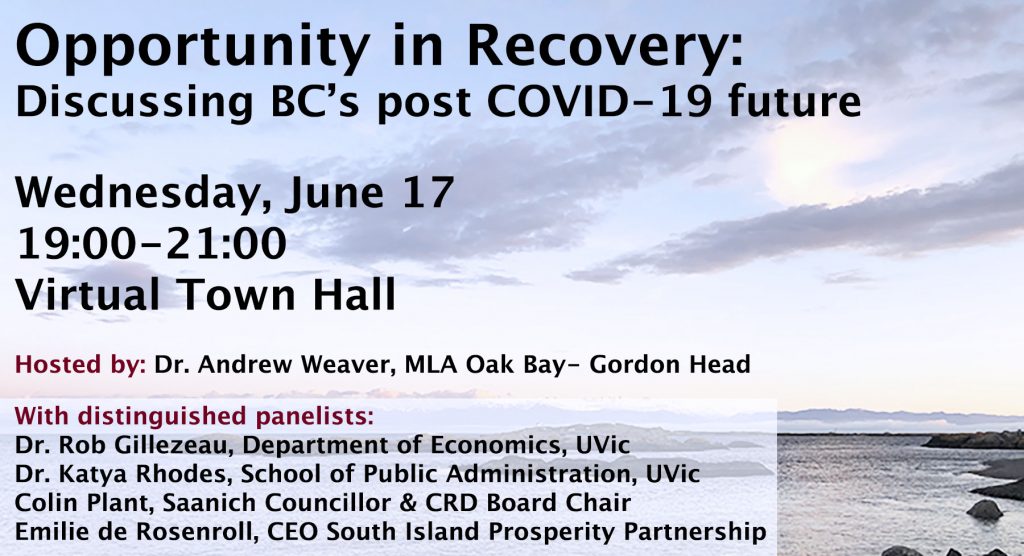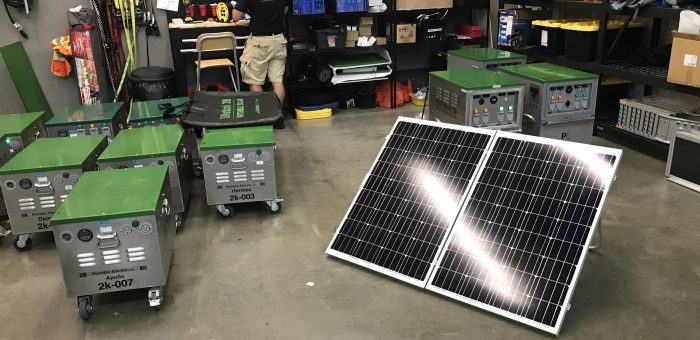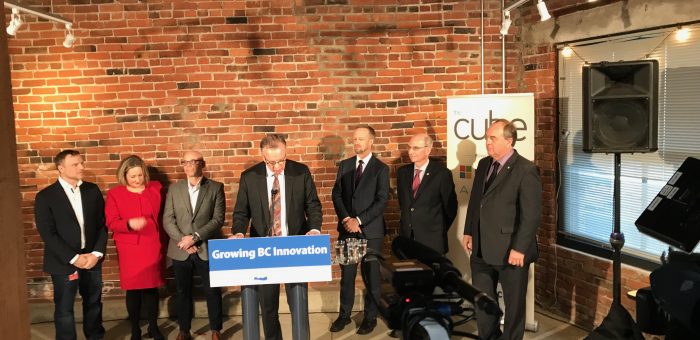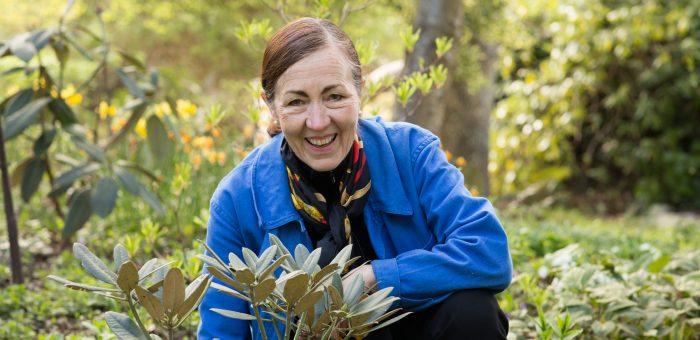Issues & Community Blog - Andrew Weaver: A Climate for Hope - Page 8
Opportunity in Recovery: A Discussion of BC’s post COVID-19 future
On Wednesday June 17 we held a virtual town hall to discuss BC’s post COVID-19 future and answer any related questions. It was a very successful event and I grateful to the myriad participants for their thoughtful questions and comments. We’ve had a lot of requests for a copy of the video of the event and so I’ve reproduced it below for those interested.
I wish to offer sincere thanks to the panelists Katya Rhodes, Rob Gillezeau, Colin Plant, Emilie de Rosenroll and special guests Merran Smith and the Honourable George Heyman for their insightful contributions to the town hall.
Video of Panel Presentation
Opportunity in Recovery: Discussing BC’s post COVID-19 future
Join us on June 17 for a virtual town hall hosted by Dr. Andrew Weaver, MLA for Oak Bay-Gordon Head. Dr. Weaver will be joined by distinguished panellists Dr. Rob Gillezeau, Dr. Katya Rhodes, Colin Plant, and Emilie de Rosenroll to discuss BC’s post COVID-19 future and answer any related questions you may have.
Please confirm your attendance in advance by registering using the link below.
Register in advance for this webinar:
https://us02web.zoom.us/…/register/WN_QtJOU8iGRhKQT8a7kmr75Q
After registering, you will receive a confirmation email containing information about joining the webinar.
Panellist Bios:
Dr. Katya Rhodes is an Assistant Professor in the School of Public Administration and member of the Institute for Integrated Energy Systems at the University of Victoria. She investigates the topics of low-carbon economy transitions and climate policy design using survey tools, energy-economy models, media and content analysis. Prior to joining the academia, Dr. Rhodes worked in the British Columbia (BC) Climate Action Secretariat where she led greenhouse gas (GHG) emissions modelling and economic analyses for the provincial CleanBC plan.
Dr. Rob Gillezeau joined the Department of Economics at the start of 2016. Prior to joining the department, he served as the Chief Economist in the Office of the Leader of the Official Opposition in Ottawa. Dr. Gillezeau’s research applies causal methodology from labour economics to answer questions in modern American and Canadian economic history. His work has examined questions related to the interaction of the War on Poverty and the 1960s race riots, the growth of the North American trade union movement, and the role that the Transatlantic slave trade played in the development of ethnicity on the African continent.
In 2016, Emilie de Rosenroll became the inaugural CEO of the South Island Prosperity Partnership (SIPP). She spearheaded a number of economic development initiatives, including the regional Smart Cities strategy, involving over 50 organizations and including 15 local Governments. Drawing on her extensive governance and Public-Private expertise, the first phase of the strategy focuses on transportation and mobility followed by a focus on building common data platforms along with measurement of Mobility Wellbeing.
Colin Plant is a Saanich councillor where he serves as chair of the arts, culture and heritage committee and as chair of the of the Saanich LGBTQ sub-committee. He is also drama teacher at Claremont Secondary school and is chair of the Capital Regional District Board. Originally from Salmon Arm BC, Mr. Plant graduated from Stelly’s secondary in 1990 as the class valedictorian and has lived in Saanich for 15 years.
The opportunity for change in a post covid-19 economy
Today the Vancouver Sun published an opinion piece that I recently wrote.
Undoubtedly, the COVID-19 pandemic has introduced uncertainty into all echelons of daily life. But uncertainty need not inspire fear. Uncertainty is the precursor to innovation and innovation is the precursor to change. We are offered two choices today. To fear uncertainty and to fear change, or to see this generational challenge as a generational opportunity.
Below I reproduce the text of the opinion piece. The original is available on the Vancouver Sun website.
Text of Article
It’s been just over two months since BC declared a state of emergency in response to the COVID-19 pandemic and only a few days since relaxed restrictions were introduced in stage 2 of our provincial response. Yet judging from the myriad communications my office receives, British Columbians are still very nervous about the future.
While various commentators are suggesting we are heading into a “new normal” for business and, more generally, society as a whole, it’s far from clear what that “new normal’ looks like. Therein lies an incredible opportunity for the creation of long-term socially, environmentally and fiscally resilient and sustainable policies for British Columbia. For right now “uncertainty” seems to be the only thing “normal” in our daily lives.
Every challenge, whether it be global climate change, poverty reduction, the opioid crisis, the changing nature of work or even the COVID-19 pandemic, presents us with an opportunity for creativity & innovation; in other words, an opportunity to do things differently moving forward. For often the single biggest impediment to change is fear of the uncertainty that it will bring. Many entrench and defend themselves in the comfort of the status quo.
Jurisdictions that emerge from the COVID-19 pandemic stronger than before the deadly virus took hold will be those that adapt and respond in a timely fashion. Standing by and waiting for the holy grail of a vaccine or herd immunity, which may or may not ever occur, is simply not an option.
We are incredibly fortunate to live in British Columbia. Our provincial response to the pandemic to-date has been nothing short of exceptional. We’ve had calm, collected, evidence-based leadership by provincial Health Officer Bonnie Henry and Health Minister Adrian Dix. And most individuals and business have responded quickly to their requests, suggestions and orders.
As a direct consequence, British Columbia is now in a position to capitalize on the opportunities for change that the COVID-19 pandemic has created. But this will require an ongoing commitment to focus on the sage advice offered in a number of reports that were recently presented to the province.
On January 30, B.C.’s Food Security Task Force report was publicly released. “The Future of B.C.’s Food Systems” issued four recommendations designed to situate BC on an innovation pathway to capitalize on our strategic advantages in this sector. The report notes that the Netherlands ranks 131st in the world in terms of land area but is the world’s second largest exporter of agricultural goods. This is only possible because of the country’s focus on high value products, investments in innovation ecosystems, support for supply chain development, and strong land use policies. That’s what we should be doing in BC.
On May 11th the Emerging Economy Task Force final report was publicly released with 25 recommendations to assist British Columbia capitalize on global trends and technological advancements in the years ahead. That same day the final report from BC’s inaugural Innovation Commissioner, Dr. Alan Winter, was also publicly released. Dr. Winter provided five recommendations to government to encourage and assist the transformation of our economy to one that is resilient, based on our strategic strengths, and ready to lead in the 21st century.
And we will soon learn more from three distinguished scholars who are putting the finishing touches on their report exploring the role that basic income might play in reducing poverty and preparing for the emerging economy. A sneak peak of what we might expect from them appeared in an article entitled “Considerations for Basic Income as a COVID-19 Response” that was published Thursday by the University of Calgary’s School of Public Policy.
A common theme in all these reports emerges. In light of the threat of pandemics, growing income inequality, and climate change, as well as the changing nature of work, modern economies need to quickly prepare. What has worked in the past will not work in the future.
As British Columbia emerges from the COVID-19 pandemic over the next year or so, we must learn from our mistakes and capitalize on opportunities that have arisen. The global shortage of protective medical equipment highlighted the importance of shoring up local supply chains and ensuring we have diversified manufacturing capacity locally. The complete chaos unfolding in the United States and Brazil as COVID-19 runs rampant there also underpins the importance of evidence-based decision-making in policy formulation.
British Columbia must also rethink its approach to the resource sector. Globalization has meant that we’ll never compete with jurisdictions that don’t internalize the social and environmental costs of resource extraction unless we are smarter, more efficient, cleaner and innovative in our extraction methodologies, and focus on value-added products for export. Sadly, our approach in recent years has been to literally give away our raw natural resources with little focus on the long-term effect this will have on the well-being and sustainability of rural BC.
British Columbia has three strategic advantages that set it aside from other jurisdictions around the world. 1) British Columbia is one of the most beautiful places anywhere to live. As such, we can attract to BC and retain the best and brightest worldwide because of the quality of life and the stable democracy that we can offer. 2) We have one of the best K-12 and postsecondary education systems in the world. They produce a highly skilled and educated workforce ready to meet the challenges of the 21st century. 3) We have boundless renewable resources in the form of clean energy, wood, water and agricultural land. And we have an economic plan embodied in CleanBC that recognizes these strategic strengths at its very core.
We should be using our strategic advantage as a destination of choice to attract industry to BC in highly mobile sectors that have difficulty retaining employees in a competitive marketplace. We should be using our boundless renewable energy resources to attract industry, including the manufacturing sector, that wants to brand itself as sustainable over its entire business cycle, just like Washington and Oregon have done in attracting a large BMW manufacturing facility and Google data centre to their jurisdictions.
We should be setting up seed funding mechanisms to allow the BC-based creative economy sector to leverage venture capital from other jurisdictions to our province. Too often the only leveraging that is done is the shutting down of BC-based offices and opening of offices in the Silicon Valley.
Undoubtedly, the COVID-19 pandemic has introduced uncertainty into all echelons of daily life. But uncertainty need not inspire fear. Uncertainty is the pretext to innovation and innovation is the pretext to change. We are offered two choices today. To fear uncertainty and to fear change, or to see this generational challenge as a generational opportunity. I prefer the latter and I’m excited to continue working with the BC NDP government in our attempts to capitalize on this opportunity.
Innovation as the foundation of a post-COVID19 economic recovery plan
Today the BC Government released the final report from Dr. Alan Winter, BC’s former Innovation Commissioner. As noted in the accompanying government press release, Dr. Winter’s report makes the following recommendations:
- fund the establishment and operation of “innovation precincts” across B.C.;
- support the development of emerging technology clusters;
- use the CleanBC plan as an economic driver;
- incent and protect intellectual property; and
- invest in leadership talent development strategies.
Over the last two years I had numerous meetings with Dr. Winter as he developed his final report. Needless to say, I am very supportive of the report’s recommendations. His recommendations will be invaluable in helping B.C.’s tech sector to advance and are of particular importance, given our collective challenge of economic recovery in the wake of COVID-19. B.C. is well placed to support and apply technology and innovation as we build a sustainable, low-carbon economy that will benefit all British Columbians.
The BC Government also released the final report of the Emerging Economy Task Force today. As noted in the accompanying government press release, the report made 25 recommendations presented within five key strategic priorities:
- embracing technology and innovation
- leveraging B.C.’s green economy
- building a highly skilled and adaptable workforce
- ensuring an effective enabling ecosystem
- demonstrating public sector leadership
An Emerging Economy Task Force was proposed as a means of addressing how technology, innovation and global trends are changing business and society. To stay competitive, B.C. must anticipate the challenges and opportunities associated with change and how they impact the many sectors of our economy, from forestry and mining to tourism and clean technology.
Prior to the release of the reports I met with the Michelle Mungall, Minister of Jobs, Economic Development and Competitiveness, and Rick Glumac, Parliamentary Secretary for Technology to brainstorm ways of moving forward with the innovation agenda. It’s clear to me that government is excited about the potential for economic advancement in the ways outlined in the aforementioned reports. I look forward to working with the Minister and Parliamentary Secretary as the reports’ recommendations are implemented.
The creation of an Innovation Commission as well as an Emerging Economy Task Force were key aspects of the strategy for the new economy component of the BC Green Party Platform that I championed in the 2017 Provincial Election. I was delighted that the BC NDP shared my vision and agreed to including both as key elements of the Confidence and Supply Agreement.
Over the last three years it has been a distinct pleasure working with government, Dr. Alan Winter (Innovation Commissioner) and Ms. Kathy Kinloch (Chair, Emerging Economy Task Force and President of BCIT) as these reports were developed. I wish to extend my sincere thanks to all members of the Emerging Economy Task Force, as well as Dr Winter, for their exceptional work that will be invaluable as we move forward with a post COVID19 recovery plan.
Valerie Murray receives 2020 BC Achievement Community Award
Valerie Murray of Victoria has been awarded a BC Achievement Community Award for 2020. A long-time resident of Oak Bay, Valerie recently moved to our neighbouring community of Fairfield. Valerie is one of 25 remarkable individuals from around the province who were recently selected by an independent jury to receive a 17th annual Community Award.
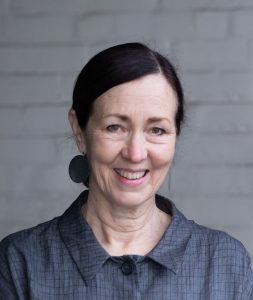 The BC Achievement Foundation established in 2003, carries out a mission to “honour excellence and inspire achievement throughout BC”. Outstanding members of the community are recognized for their exceptional contributions that build community spirit and inspire present and future generations to step up and do the same. The recipients of the 2020 Community Award will be recognized in a formal presentation ceremony in Victoria, in the presence of the Honourable Janet Austin, OBC, Lieutenant Governor of British Columbia. Each recipient will receive a certificate and a medallion designed by BC artist Robert Davidson, OC, OBC. Due to COVID-19, the ceremony planned for the end of April has been postponed to a future date to be announced.
The BC Achievement Foundation established in 2003, carries out a mission to “honour excellence and inspire achievement throughout BC”. Outstanding members of the community are recognized for their exceptional contributions that build community spirit and inspire present and future generations to step up and do the same. The recipients of the 2020 Community Award will be recognized in a formal presentation ceremony in Victoria, in the presence of the Honourable Janet Austin, OBC, Lieutenant Governor of British Columbia. Each recipient will receive a certificate and a medallion designed by BC artist Robert Davidson, OC, OBC. Due to COVID-19, the ceremony planned for the end of April has been postponed to a future date to be announced.
Born and raised in Victoria, BC, Valerie has been a dedicated volunteer and supporter of many organizations involving the arts, music and gardening for 3 decades. She has passionately advocated for the inclusion of music in the lives of children. Valerie served on the University of Victoria Finnerty Gardens Advisory Board for 15 years and on the Victoria Conservatory of Music Board. Valerie is also a former member of Oak Bay’s Heritage Commission. For over 10 years, Valerie has served as Head Gardener for Friends of Government House Garden Society. At Government House, Valerie has led teams of volunteers of all ages, who provide her with inspiration and she says “if not for the commitment of our volunteers, the beautiful gardens as we have known them for the last 25 years, would not exist”. She is quick to praise the many volunteers who do so much in our community.
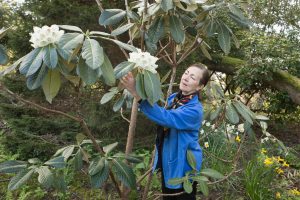 Valerie is one of the founding members of the Breakfast2Music (B2M) program. Breakfast2Music is a registered not-for-profit society that raises funds to provide nutritious breakfasts and support music programs in schools across Greater Victoria. After learning that one in six students go to school hungry, Valerie knew it was a critical issue to address. “Kids need to get their day off to a good start. Hungry kids can’t focus or learn. Hungry kids are more likely to have behavioural problems. Breakfast programs encourage kids to come to school and as well as providing nutrition offer important social contact when they eat together ”. Of the funds raised by B2M, ideally 75% goes towards funding breakfast programs and 25% goes towards music programs (such as support with musical instruments and University of Victoria music student tutors to support individual students).
Valerie is one of the founding members of the Breakfast2Music (B2M) program. Breakfast2Music is a registered not-for-profit society that raises funds to provide nutritious breakfasts and support music programs in schools across Greater Victoria. After learning that one in six students go to school hungry, Valerie knew it was a critical issue to address. “Kids need to get their day off to a good start. Hungry kids can’t focus or learn. Hungry kids are more likely to have behavioural problems. Breakfast programs encourage kids to come to school and as well as providing nutrition offer important social contact when they eat together ”. Of the funds raised by B2M, ideally 75% goes towards funding breakfast programs and 25% goes towards music programs (such as support with musical instruments and University of Victoria music student tutors to support individual students).
The COVID-19 pandemic has brought much more awareness to the issue of food security in Victoria and the importance of programs like B2M. Although lunch programs are funded provincially in many of our schools, the breakfast programs are not, depending instead on a patchwork of efforts, involving various fundraising organizations and local service groups. It is Valerie’s hope that stable funding will be found to level the playing field and ensure that all students are able to start the day with a full tummy. “First we eat, then we learn, and then we thrive”.
We are so fortunate to have someone as talented and generous as Valerie in our community. She has given so much of her talent and passion to the benefit of so many – students, volunteers and all of us who enjoy the beauty of the gardens where she lends her expertise as a master gardener. Thank you, Valerie for your exceptional contributions to your community and congratulations on the well-deserved honour you have received as a recipient of the 2020 BC Achievement Community Award.

